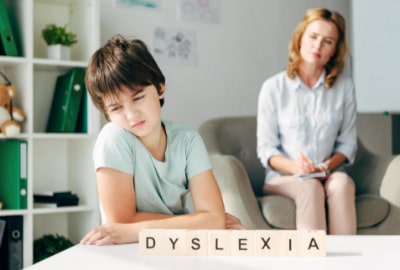There are many reasons why some kids struggle with reading. And sometimes, it’s not something that you can immediately fix. However, you can do things to help your child improve their skills and give them the confidence they need to have in themselves as readers.
I know you love your child and want to find the best way to support them. But it’s not always easy when they struggle with reading at first-grade level or higher. Sometimes, struggling kids need encouragement and extra help beyond what you can do independently.
I’ll teach you about some possible contributing factors to your kids’ struggles.
I’ve also compiled some things you should be doing to help your child improve their skills as readers and give them more confidence.
Why do students struggle with reading?
A Family History of Reading Challenges
Children whose parents have struggled with reading themselves may find it challenging to learn how to sound out words.
Family history comes in many forms – there could be a genetic predisposition for dyslexia and other similar learning disorders and a current disability that might create context-specific barriers.
As a result, children may have difficulty learning to read and may require extra support, especially in the early grades.
The child’s school environment – does the school encourage good reading skills, or do they promote a ‘drill and kill’ mentality? Are they providing the proper support for your child?
This includes having a curriculum tailored to your child’s needs.
If you feel like your child is falling behind, they may not be getting the help they need.
Dyslexia
Many children have problems reading, and some of them struggle with dyslexia.
Dyslexia is a specific learning disability that affects reading, writing, and spelling. It can be related to other issues like ADHD and autism spectrum disorder.
It’s when a child has trouble recognizing sounds in language and cannot distinguish between letters and numbers. This causes a problem with organizing words in sentences and writing.
Previous Speech Delay
Some kids struggle with reading because they have a speech delay.
Speech delays can be caused by hearing differences in sound and grasping how language works. Kids need to listen to these differences in the sound of words.
This could be due to previous speech delay, an early intervention program, or a language disorder. Even if the child receives support for their delayed language development and can progress into school age with minimal difficulty, it can still surface later on in life.
Mixing Up Letters and Losing Skills
Children who struggle with reading may have trouble with similar words, like “sit” and “site.”
Children might also mix up letters in the middle of a word because they are not making the connection between letter sounds and letters.
One sign of a genuine issue is forgetting the word spelling in previously mastered words, which means there may be a problem with decoding or recognizing letters.
Avoiding Reading at All Costs
Some children may avoid reading because they don’t like to read or because they find it hard to understand. Other kids may not want to read because they aren’t good at it.
Kids who struggle with reading are often reluctant to read for themselves. Their anxiety about reading can sometimes make them push themselves away from reading at all. This means they fall behind in their education and often get left behind by their peers.
Kids who don’t like reading have a more challenging time learning to read.
Problems with Hearing or Eyesight
Children who have problems with their eyesight or hearing may struggle with reading.
They may have difficulty reading the words on a page due to their visual impairment or low vision. Children with hearing sensitivities might have trouble telling what sounds make up each word in text-based materials.
If there are problems with your child’s hearing or eyesight, it is best to seek help from a health professional.
They Haven’t Got to Grips with Phonics
Phonics is an essential part of reading and writing. Some kids struggle because they haven’t been taught phonics in school or cannot grasp it.
The system breaks words down into their constituent sounds and blends them together to form a word, which is then put back together to sound out correctly.
In other words, phonics helps children learn how letters sound and form words out of them.
However, many schools struggle with effectively teaching this skill despite having it as one of their official curriculum goals for literacy development.
Phonics instruction is a meaningful way to teach your kids how to read. However, some parents are not experienced in this area, so they struggle with teaching their children at home. Fortunately, there are many kids’ reading programs available that can help!
They’re Not Practicing Enough at Home
Some kids struggle with reading because they don’t practice enough or get bored.
How often do you read to your children?
When life gets busy, it’s easy to let reading fall by the wayside. Reading with them at home is a small commitment that considerably impacts fluency, comprehension, and confidence.
School Books are at the Wrong Level
Teachers might think that they’re building confidence by giving children books that are easier to read, but this may actually be counterproductive for some students.
While some teachers might give kids a challenge by increasing the reading difficulty that is too hard for them to handle. The students would then be stuck, causing frustration and apprehension for reading.
Parents should speak to their child’s teacher if they think the difficulty level is incorrect.
Reading Comprehension Problems
If children can read words but have trouble understanding what they mean, it could mean there’s a problem with comprehension. This can happen when a student reads a story without paying attention to the context or the emotional meaning behind the text.
Children struggling with reading comprehension may also have difficulty with other skills, like listening, speaking, and writing.
It can be challenging to get children to focus on the meaning behind the words they read (reading comprehension).
English is Not Their First Language
Some children have problems with reading because they don’t speak English at home. These students may also face a learning curve when learning to read because English is not easy.
ADHD
Some kids struggle with reading because they have an attention deficit disorder like ADHD. This can be treated by various treatments, including medication, therapy, and educational support through tutoring or online programs.
Although children with ADHD may have an attention deficit, they can still read. They need the proper environment to focus on a book or article without being distracted by other things around them.
Children with this disorder often struggle with impulse and attention management due to their hyperactive behavior.
Phonemic Awareness Difficulties
Phonemic awareness is the skill of manipulating sounds in languages. It’s the single most significant predictor of reading success. It starts with knowing how to manipulate sounds within a language.
Children who struggle with phonemic awareness may have trouble sounding out words when reading aloud. Children who find it hard to identify the sounds in language are more likely to have phonemic awareness difficulties.
In some cases, phonemic awareness difficulties can be caused by the lack of practice manipulating sounds.
Extra Time Needed to Grasp Phonics Skills
Every effective reading program must prioritize phonological awareness and phonics instruction. The cause of a child’s reading struggles may be their lack of understanding of how to read in general, which can lead to the extra time needed for grasping this skill.
Lack of Literacy Exposure at Home
A struggling reader often lacks reading practice and revision of skills. This issue can be fixed by providing explicit instruction and plenty of practice at home.
A child’s home should contain age-appropriate reading material and a variety of diverse books that encourage children to read for fun.
Lack of Evidence-Based Literacy Instruction
Some children struggle with reading because they don’t have adequate, evidence-based literacy instruction. Children should be taught proper decoding techniques, not to guess words.
Evidence-based literacy instruction is a way to improve reading achievement. It relies on evidence-based research and instruction that provides parents and teachers with the skills they need to teach children how to read, write, and speak for them to learn effectively.
Whole language approaches to teaching literacy indicate that a teacher is not providing evidence-based instruction. Evidence-based instruction includes understanding foundational concepts, reading strategies, and comprehension skills to learn how to read effectively.
Lack of this type of instruction can cause children difficulty learning specific tasks or simply not knowing them when starting school.
What Can Parents do if They Suspect a Severe Reading Delay?
Parents should trust their instincts when they think something is wrong.
Speak to your school as there may be factors that are not easily fixed without professional intervention by educators.
Your teacher can help determine which resources would be most effective for you and your child.
How Parents Can Help Struggling Readers at Home
As the school year winds down, we often wonder what we can do to help our kids who are struggling with reading. We feel frustrated and helpless, but there are many things we can do to help our kids read successfully.
Read Together and Discuss
Some kids have trouble understanding what they are reading in books. Reasons for this could be that we don’t read to our children often or that we don’t help them understand key words and main ideas while they are reading.
When reading together, try talking about key features of a book before and after reading. Explain important terms and help your child understand the story’s major plot points.
Encouragement
Some kids just need extra encouragement.
One of the best ways of encouraging your child is to celebrate small wins. This can help your kids develop a more positive attitude towards their struggling skills and feel like they are making progress.
Praise the effort your child is putting in. This will motivate them to continue working towards their reading goals and build a stronger relationship with them.
Reading Instruction
A child might struggle to read because they are not being given the instruction that helps them learn. This can be due to various reasons, and parents should help their children in any way possible.
Incorporate Phonics and Phonological Awareness: Vital Skills for All Beginning Readers
Phonological awareness, the ability to recognize and manipulate oral sounds into orthographic representations of written text, is vital for learning to read.
It enables students to map verbal sounds onto their corresponding letter counterparts to develop literacy skills.
Invest in a beginning reading program, like Children Learning Reading, that incorporates phonological awareness and phonics instruction to help your kids learn how to read. These skills are vital for all children, even those having a hard time learning the alphabet.
Build Vocabulary
One of the most essential strategies for helping struggling readers is to teach them new words.
There are many ways to build your child’s vocabulary, such as using flashcards, playing word games, and just spending more time interacting and communicating with your child.
Another easy way is to introduce a lot of real-life and familiar objects into the home environment. This can help your child build relationships between new words and their meanings and encourage them to talk about things they see.
Read Aloud With Your Child
Take advantage of any opportunity to read with your child and help them develop the skills needed for success.
Reading with your child can provide them with individual support and guidance. It is a great way to give your kids the love of reading that they need.
Reading aloud with your child is a great way to spend time together and maintain consistency. You can schedule it on Sundays, Wednesdays, or any day of the week in short sessions when you don’t need to worry about work calls or other interruptions.
Variety
Kids need access to a wide variety of books so that they can choose their own reading materials.
Ideally, there should be a variety of levels and types of books at home for kids to choose from. This will keep them interested in reading more and allow them to read what they are most interested in without being limited by their parents’ choices.
Conclusion
This article looked at some of the reasons kids struggle with reading. We hope that it has helped you understand why some kids struggle with reading and feel more informed on the topic. Click the button below to learn more about our recommended home reading program for struggling readers.
FAQ
How can you help a child to build interest in reading?
Introduce your child to all kinds of reading formats such as graphic novels, comics, recipe books, magazines, and audiobooks. Make sure you provide support and encouragement throughout the process, even if they don’t always respond well or it takes years to get over their initial apprehension.
What are the common reading difficulties?
Some kids struggle with reading due to word accuracy, comprehension, and fluency issues. Common difficulties for struggling readers include dyslexia, developmental language disorder, and attention deficit hyperactivity disorder (ADHD).
Related Articles
How Does Reading Help the Brain? A Guide for Parents
How Does Reading Help the Brain? The Ultimate Reading Guide for Parents Welcome to an eye-opening exploration of the captivating question: "How does reading help the brain?" Prepare to be amazed as we delve into the incredible ways reading nurtures brain...
How to Teach Letter Sounds to Struggling Students: The Best Ways to Teach Sounds for Word Identification
How to Teach Letter Sounds to Struggling Students: The Best Ways to Teach Sounds for Word Identification Are you looking for effective strategies on how to teach letter sounds to struggling students? Mastering letter sounds is a crucial step in a child's...
What are Long Vowels and Short Vowels in English?
What are Long Vowels and Short Vowels in English? I know how challenging it can be to teach our little ones the foundations of reading. One of the key building blocks for early literacy is understanding what are long vowels and short vowels. But don't worry -...
The 5 Stages of Literacy Development in Children’s Reading
The 5 Stages of Literacy Development in Children's Reading As a parent, you may have noticed that your child's journey towards becoming a confident reader can be both exciting and challenging. Perhaps you're wondering what you can do to support your child's literacy...
Research-Backed Benefits of Reading for Young Children
Research-Backed Benefits of Reading for Young Children As a parent, you know that reading with your child is important to their development. But did you know that there is actually a ton of research to back up the benefits of reading for young children, especially for...
What Does Decoding Mean in Reading? How Decoding Can Help Your Child Thrive
What Does Decoding Mean in Reading? How Decoding Can Help Your Child Thrive Before kids can tackle more complex texts and dive into the world of literature, there's one crucial building block they need to master: decoding. If you're wondering, "what does decoding mean...
How to Teach Onset and Rime: Helping Your Child Become a Reading Superstar
How to teach onset and rime: Helping Your Child Become a Reading Superstar As a former elementary school teacher and mother of two, I know firsthand the importance of teaching onset and rime to young readers. I remember the joy and pride on my own children's faces...
Activities to Teach Phonemic Awareness
Activities to Teach Phonemic Awareness Are you looking for ways to help your little one start to learn phonemic awareness? Phonemic awareness is a critical skill for literacy development and can be taught at home with the right activities. This blog post will provide...
What is Fluency in Reading? A Fluency Guide for Parents
What is Fluency in Reading? A Fluency Guide for Parents Fluency is essential for academic success and brings more joy and satisfaction when reading. But what is fluency in reading? In this blog post, we'll discuss what fluency in reading is, Its main components and...
My First Grader is Struggling with Reading: Advice for Parents
My First Grader is Struggling with Reading: Advice for Parents Is your 1st grader struggling with reading? You're not alone. According to Amplify Education Inc, approximately 40% of first graders were below grade level in reading in 2020. While it can be frustrating...
Why is Phonological Awareness Important?
Why is Phonological Awareness Important? You're probably wondering: Why is phonological awareness important? Phonological awareness is a critical skill for reading success. It includes hearing, identifying, and manipulating individual sounds in spoken words. In this...
Why Reading Aloud is Important for Your Kids
Why Reading Aloud is Important for Kids Reading aloud is a great way to help your child learn to read. However, many parents need to do it more often. In this post, we'll discuss the importance of reading aloud with your child and give tips for making it more...
What are Read Alouds? Definition, Purpose, and Tips
What are Read Alouds? Definition, Purpose, and Tips Are you familiar with read-alouds? If not, they are a great way to encourage children to learn. Read-alouds allow parents and educators to work with kids in a fun and interactive way. They can also help enhance...
Read Aloud Benefits: Why Reading Aloud With Your Kids is Crucial
Read Aloud Benefits: Why Reading Aloud With Your Kids is Crucial You've probably heard that reading aloud to your kids is one of the best things you can do for their development, but you might not know how to start. This post will teach you everything about read-aloud...
Reading Games for 2nd Graders
Reading Games for 2nd Graders Do you have a second grader in your life? If so, they are probably reading more than ever before. But that doesn't mean they don't need some fun while they are doing it! Here are a few things to consider regarding reading games for 2nd...
Comprehension and Reading Pages for 2nd Graders
Comprehension and Reading Pages for 2nd Graders Are you looking for comprehension and reading pages for 2nd graders? If so, you've come to the right place. In this post, we'll share valuable resources from around the web that provides PDFs, worksheets, and reading...
Reading Help for 2nd Graders
Reading Help for 2nd Graders Getting reading help for 2nd graders can be a daunting task. You don't want them to get discouraged, but you also don't want to overwhelm them with too much information at once. This post will show you easy ways to help your child improve...
Fun Reading Activities for 2nd-Grade Kids
Fun Reading Activities for 2nd-Grade Kids Reading is one of the most important skills your child will learn. Besides improving their reading comprehension, 2nd-graders who participate in fun activities are more likely to stay on top of their schoolwork and enjoy...
What Does Fluency Mean?
What Does Fluency Mean? Fluency is speaking and writing quickly or easily in a given language. This term comes from the Latin word fluentem, meaning "to flow." Fluency can be achieved through practice and immersion in a language. It is often measured by how well...
Why is Reading Fluency Important? The Role of Fluency in Your Child’s Development
Why is Reading Fluency Important? The Role of Fluency in Your Child's Development Why is reading fluency important for your child's development? Reading fluency is important because it gives your child time to focus on comprehension and not just word recognition. It...
Related Articles

Natalie is a full-time blogger and former elementary school teacher who specializes in helping parents teach their kids to read. With a qualification in Early Childhood Education, over 7 years of experience in education, and a passion for literacy, Natalie provides practical tips, activities, and resources for parents looking to support their child’s learning-to-read journey. She is the proud mom of two young readers and loves sharing her knowledge and experience with other parents. Natalie enjoys spending time with her family, reading, and exploring the great outdoors when she’s not blogging.
























